Year 2: My full time indie developer life
2018 is over, and my situation could not be any more different than when I posted my first year as a full time game developer post. In the 12 month since, I've evolved from a solo game developer into developing a plethora of personal, team and contractual projects, establishing the pillars of a successful company and tackling on new opportunities. Unfortunately, that also means that my situation can be scrutinized more closely, which makes honest posts like these more difficult to submit. In fact, I've been told that last year's post made me difficult to recommend in some situations.
The reality is that most individuals and companies would not want to post their complete history, warts and all. It can be bad for business, better to keep it all hidden under the rug and only present yourself as the paragon of your field. But I'm going to take a leap of faith and still share my year with you as genuinely as I can. I recognize that some potential partners may read this, and I can only hope that they will value the honesty that I bring to the table, along with the growth I've seen and my relentless work ethic.
2018 may have brought some failures, but it also was a much more successful year than 2017. My main game project Tech Support: Error Unknown found a publisher in Iceberg Interactive and is looking towards a successful launch on February 27th. I also have several additional projects along with more opportunities being pursued. Although I won't be able to divulge everything, I'll cover the essence of how I am approaching the growth of the company leading into new developments.
Last time, on Dragon Slumber
Closing out last year, I had already started on my third project, a strategy simulation game setting the player as a tech support specialist trying to resolve customer tickets while being thrust in the middle of a conflict between your corporate employer and a hacktivist group. The game would be entirely presented from the perspective of a simulated computer through a replicated operating system.
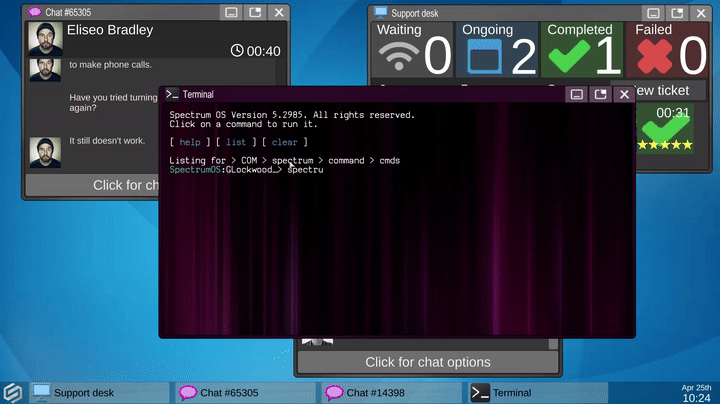
Using the terminal command prompt while resolving tickets
Tech Support: Error Unknown was a departure from my previous titles on numerous aspects. It was the first game I would develop entirely on my own, without relying on contracting artists or otherwise partnering up. This limited the game styles I could develop, since I would not be able to rely on extensive art requirements or animations. It forced me to get creative and to develop something unique, better catered to my strengths.
I settled on a simulated computer environment both because of my familiarity with it, along with the relative ease of developing the various in-game applications meant to replicate the expected software which could be found: email, web browser with several websites, the ticket manager, a customer database and more. It would take time, but the visual complexity would be limited. By doing a lot of research and using a decade of web development experience, made a point to make all the software look unique yet recognizable and easy to navigate.
Supplementing the visual style were royalty free online resources like stock images and music. Again, limits turned into strengths as I found sources with hundreds of profile images which became the baseline for the customers the player would interact with. I also used them for the several websites I crafted inside the game, including the Quasar website which I later replicated live. Then early this year, an alternate reality live event involving the hacktivists from the game would take over that website, "leaking" the release date.
In response to the criticism my previous games received concerning their linearity, I wanted Tech Support to provide more player choices and different outcomes. The story of conflict between a corporation and some hacktivists felt naturally weaved, but I also found myself enriching the story through several side stories whom the player could pursue and reach their own unique endings. Peppered throughout the narrative were various characters, each with their own motivations, keeping the player on their toes.
My goal was to provide a new experience for players each time they went through the game, by emphasizing the characters they chose to help, while phasing out those left aside. That meant that new objectives would be asked from the player during each play through, increasing variety and replayability. Rather than a simple choice at the end of the game, the entire experience would matter and the story as a whole would change, including which characters appeared and which features became available.
The project as moving along smoothly, but I remained on the alert for other opportunities to pursue as well. And then in January, the YouTube-pocalyse happened.
New projects, new learning experiences
One of my goals for my sophomore year was to be more adaptable towards different opportunities and be open to projects outside of Tech Support. The year started with changes with the YouTube algorithm, leading to smaller content creators finding it more difficult to promote their videos. Knowing the struggle felt by starting content creators, I decided to develop a new web platform which I hoped would help them get the word out.
Taking inspiration from other gamified web platforms, I designed and coded the MVP for TubeSpark in about a month. It's a system which encourages viewers to discover new great content by enabling YouTubers to feature a single one of their videos. Viewers could then give it a thumbs up or down, which affected how often that video would be seen by other viewers. Achievements were added to encourage voting, sharing content and other actions. And to provide equal opportunities, YouTubers could reset their stats after a certain period, by putting up a new video with a higher appeal to the audience.
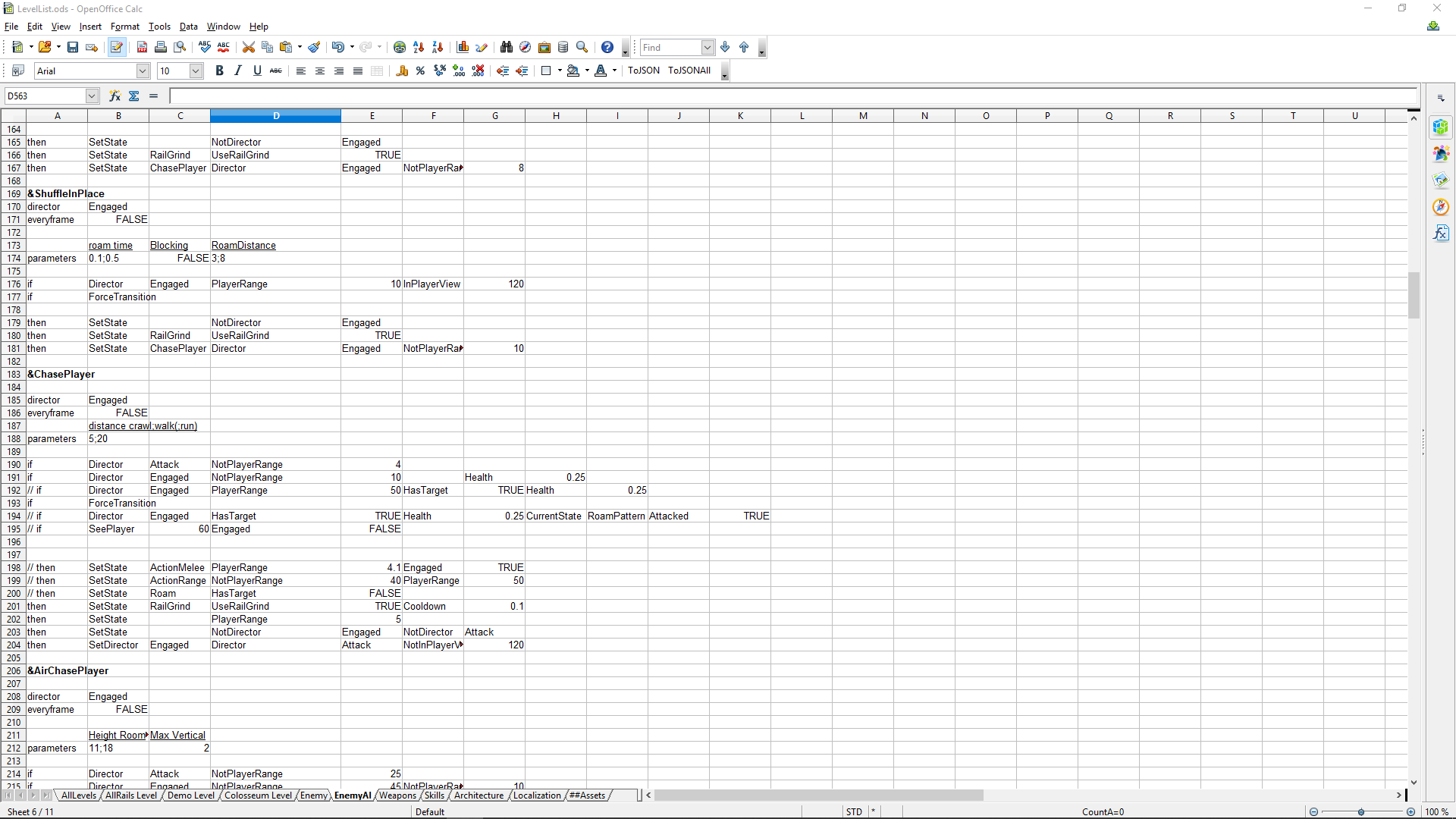
Clutter free presentation and clear CTAs
Unfortunately, TubeSpark would be marred with the same issues as my previous games, difficulties in getting the word out and promoting it. Finding YouTubers wasn't too difficult, however getting a steady influx of viewers proved to be more difficult than anticipated. The issue being that YouTube communities tend to revolve around a specific YouTuber, rather than the YouTube platform itself.
TubeSpark never found the growth it deserved. Because I didn't have the financial resources to better promote it, it never grew the audience necessary to reach a critical mass. The people who used the platform did enjoy it, and I've heard numerous accounts of viewers cycling through every video available, but this is such a unique service that hefty promotion through advertisement, conventions and networking becomes neigh obligatory.
The website does remain available to all as a free service however, not even using any advertisement to subsidize itself. I still believe it has a chance to take off with the proper investment and intend to revisit the concept at a later date once the right opportunity comes along.
Becoming a Digital Rogue
Despite the delays caused by TubeSpark's development, Tech Support: Error Unknown was still moving forward at a steady pace. Expecting the game to be completed shortly, I started looking about for a new project to follow it. Happenstance brought me to an ad by a 3d artist looking for the right project, posted in a large Discord server for which I am an administrator.
Jordan wasn't looking for anything specific, rather casting his line out and seeing who would bite. After getting in touch, we quickly recognized that we had similar ambitions. I didn't want to rush into any partnership however, so we decided to work on a quick Ludum Dare project to see if we had chemistry as partners.
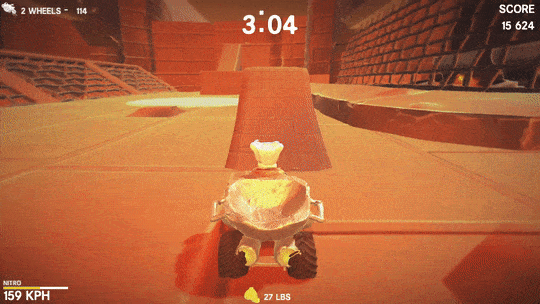
An explosion of cheese!
Following the theme “Combine 2 Incompatible Genres”, we devised Recipe for Disaster, which combined physics driven racing with on-the-fly cooking. Players would navigate an obstacle course to grab ingredients and bring them back to the ever cooking pizza in the middle of the field before the pizza was done cooking.
As a 72 hour project, the game had an ambitious scope, including building a leaderboard system, managing the recipe and finding fun solutions once it became clear my original level design was too large. At the end of the three days, I wanted the project to feel like a complete package and I feel we succeed with that, in no small part thanks to the presentation images Jordan cooked up. He also crafted an amazing looking vehicle with a ton of personality, along with the oven environment in which we evolved.
Although the end result would not yield a victory, we were very satisfied with each other's work ethic and approach, and so we decided to begin work on a whole new project, by far the most ambitious I have been a part of. Taking inspiration from Dead Cells, Devil May Cry and Jet Set Radio, I started designing Digital Rogue, a 3d acrobatic action game with roguelite elements.
The workload was easily distributed, with Jordan taking the lead on visual design and lore, while I focused on game design and programming. My goal was to make a game which would be just as fun when the player was locked in combat as without. Early designs involved grinding on rails, running on walls and platforming with ledge grabbing as good, fast actions which were satisfying. As the prototype was further developed using numerous Unity assets as baselines, I incorporated basic melee and ranged attacks, combos, air juggles, wall splats and other fun options for the player.
Other features I worked on during this early period included procedurally generated levels, both as a series of pre-established connected rooms and a room builder which crafted an environment from scratch. Being a rogue like, I allowed different builds for the character, changing the stats and different abilities. Players can use different weapons with different attributes and I built a system to procedurally generate weapons as well.
As with my previous projects, spreadsheets were instrumental in creating my data structure, with a macro converting all the data to a readable JSON format. Along with all statistics, I also have different parameters for the maps, including which architectural objects to use, and even use it to establish the AI behavior of my enemies, making it easy to create new enemies with entirely new behaviors rapidly.

AI structure in the spreadsheet
Digital Rogue was my main focus for a few months as I established foundations upon which Jordan would be able to build a world, along with any artist we brought on board . A series of early walls and set pieces were created, along with character models for a ground enemy, a flier and DECCA, our hero.
Our goals with Digital Rogue are far loftier than my previous projects, including Arelite Core. We fully expect this to take several years to complete and require numerous full time contractors or employees to finish. Though there is little to reveal concerning this project at this stage, I expect to cover its development in further detail for my next end of the year post.
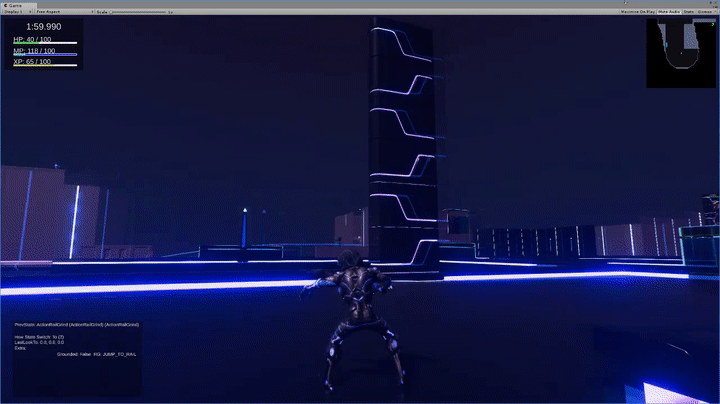
Work in process which will be out of date by the time this is out
Hunt for a publisher
For now I was happy with the foundations I had established for Digital Rogue and was ready to get back to Tech Support with fresh eyes. In February, I had made my first big marketing push of the project by releasing an announcement trailer alongside a press release. It was my first chance to get a feel for the interest people had for the project. Reception was positive those who heard about the game, but ultimately my voice was lost amongst the hundreds of other devs also trying to make their place.
Despite ongoing promotional efforts, it became increasingly clear that I would not be able to build the momentum necessary for a successful launch. Steam wishlists were well under the ten to fifteen thousand I felt were necessary, and the press push had only brought disappointing results. I knew that I would need to bring a publisher onboard to help with the marketing and avoid the fate of my previous two titles.
Having already prepared a pitch deck for the game, I used the OneMoreGameBro list of publishers along with some of my own research, sending out requests to over a hundred different publishers and receiving nearly 20% replies, with most wanting more details about the project and my request.
I knew that Tech Support could be a very attractive prospect for a publisher, since the game was already mostly complete and the funds requested were not going to me but rather the promotion of the game. This would limit risks on their part, but I also had high expectations as to how much they would be investing in the game and where those resources would be allocated.
As I met with several publishers over Skype, I got a better feel for them, their offer and their corporate personality. Because I put so much of myself into the game and put in long hours, I wanted to work with a publisher who would be able offer just as much. After a period of deliberation, I finally decided to partner with Iceberg Interactive. Although I won't be able to cover the details of our partnership, I do want to touch on some of the opportunities which were now available to me thanks to this new investment.
First, I need to mention the very first press release announcing our partnership, which was covered by PC Gamer. Using the same trailer I had already produced in February, suddenly we had a much stronger wave of interest as new players discovered the game, immediately growing our Steam wishlist and various social media outlets.
We also began work on the localization for the game. Being a text heavy game, it was difficult for me to afford getting a complete localization going, but now we could have both German and Chinese translations, both strong markets for the management / simulation game genre.
I also had access to a steady testing bed, which really became handy considering how many branches and details exist within the game. I'd be remiss not to mention a huge fan of the game, Dillen Fullagar, who assisted me with testing and sank nearly 100 hours in the game, breaking it in every possible way to ensure the most solid experience possible.
Being able to delegate the marketing and testing tasks allowed me to focus on some in-game features I had set aside, including some visual effects, general additional content and conversations and new Easter eggs for players to discover. I even worked on some post-launch features which will be made available for free.
New trailer
Because the release date was pushed back to February 2019, we had a chance to build more momentum for the game, a process which still continues at this time with some alternate reality video footage being produced, advertising on social medial and a new trailer coming out.
I was afforded the opportunity to attend the MEGA and MIGS conventions in nearby Montreal. Though this was my first event for Tech Support, I already had the presentation experience from my previous games. Having all my marketing material was ready weeks ahead of schedule, including promo postcards, shirts, accommodations and more, made the preparation process fairly smooth despite the short turn around time.
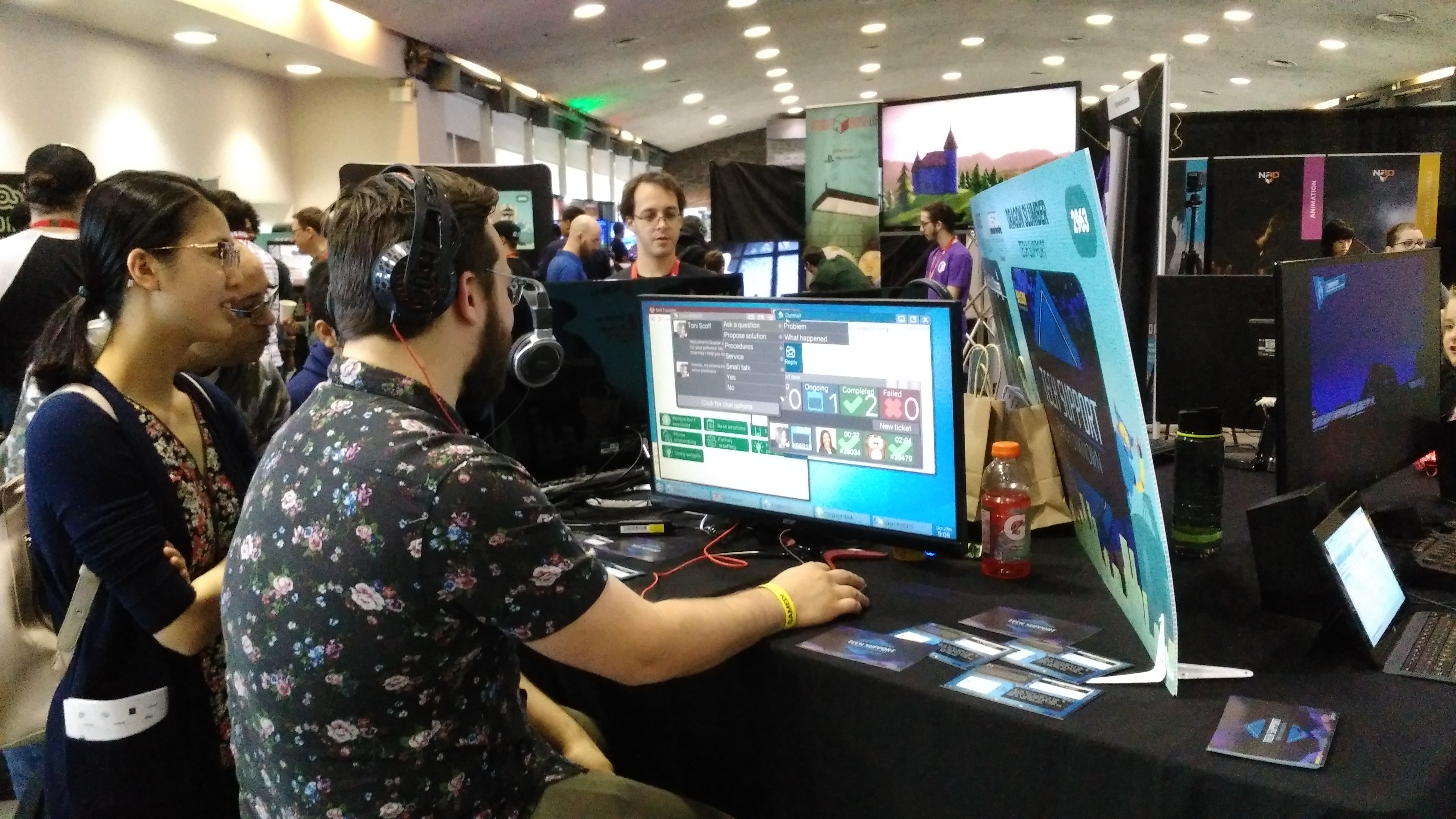
Attendees enjoying the game
Over the course of five days, hundreds of people played the game. Although I had other developers and friends test the game before, this was its first real test and the reception was overwhelmingly positive. The genre and theme drew in an intrigued and passionate crowd, and it gave me a chance to see a few issues people had with the game and note them down for future polishing.
As an added bonus, Tech Support would win the “Best indie game pitch” award at MIGS, along with “Best narrative game” and “Most innovative game” nominations at the Montreal Indie Gaming Awards. I also conducted some magazine interviews which should see the light of day within the next few months, making it a busy but fulfilling week.
Dragon Slumber Incorporated
While Tech Support was enjoying critical acclaim, other developments were brewing, with new projects going beyond the aforementioned entering preproduction. Although these must be kept under wraps for the time being, it did require me to reshape my company from a registered entity to an incorporated one. Unfortunately, I don't know all the ramifications of this change but I look forward to covering them next year.
It also required me to plan moving to Montreal, where the projects I signed on to will be able to florish better. This will be my first move in 12 years, away from friends and family. While these are all big changes and unfortunately came about too abruptly, they are well in their place in a year all about seizing opportunities.
2019, the year of growth
2018 was not the year I had expected it to be. Although I originally set out to get Tech Support out the door, I had to readjust my approach, though it's upcoming launch is looking brighter than ever.
I had originally expected my next project to be of a similar scope to Tech Support, but new opportunities instead brought me to Digital Rogue and other contractual opportunities. I also started several projects with other developers, where I'm focused on the design, production and consulting aspects while delegating the main development, which allows me to diversify my portfolio and have a fallback plan if other projects don't come through.
A lot of my approaches established in last year's post remain the same, including using Twitch and Patreon as additional visibility and revenue sources. Twitch was especially useful this year by putting me in contact with a lot of other developers, which enabled some of the projects I'm now a part of, in addition to my Discord presence.
With solid foundations now established for Dragon Slumber, I anticipate 2019 to be a year of growth as we bring new people on to the projects we've started. We are looking to create a proper vertical slice for Digital Rogue, and although I only plan to release one game this year, the wheels are in motion for several more to come out in 2020. And as for Tech Support, already we're planning post launch updates so the fans won't have to wait too long to extend their experience with the game.
The takeaway
Being an independent developer means different things to different people, but it's a struggle for anyone to get a proper foothold in the industry. There are a lot of applicants, a lot of people trying to get everyone's attention and it takes a lot of dedication and persistence to get out of it successfully. So here are a few tips I hope will be helpful to all of you feeling the pressure.
First, figure out what your goals are as a developer. My goal never was “Tech Support” or any of my previous projects, it's making games as a full time career and that's why I'm spreading my energy, diversifying my opportunities and trying to grow. It also made me seize a lot of opportunities, while remaining mindful to complete the projects I had already begun. While this does lead to long hours, I am seeing the fruits of my labor pay off.
Second, accept all the help you can get. Though we feel pride when we manage to do something by ourselves, games are complex beasts with a lot of competition, and we only have so much time. Working with Jordan and Iceberg have raised my work to a level I couldn't have on my own and I only expect it to do even better moving forward.
Third, whatever you choose to do, you need to give it your all. That often means making sacrifices in your life, it means working on your project when you're not motivated, it means taking on all the tasks for which you have little to no interest in, such as marketing. As a community, we developers are friendly, helpful and generous, but make no mistake: we are also competitors. Gamers only have a finite amount of time and money, so make everything you make stand out in some way, draw their attention and be memorable.
And above all, accept your failures, learn from them and build upon them. For me, these blog posts have been a great opportunity to showcase what I wish I had known before, actions I could have made and especially how I would approach the situation moving forward. It's easy to try to justify our mistakes, but our perception becomes irrelevant in the face of other people judging us, judging our games and making their decisions accordingly.
To the people judging me, I hope you can take this post and others I've presented in the context that they were intended: acknowledgment of my successes and growth from my failures. And to everyone else, I hope this post will provide some insight, perhaps even some inspiration, and I look forward to putting all of my 2019 mistakes and successes on display next year.
Stay up-to-date with the latest Tech Support: Error Unknown news and information:
Social Media: Twitter: https://twitter.com/dragon_slumber Facebook: https://www.facebook.com/DragonSlumberGames Discord: https://discord.gg/dragonslumber Twitch: https://www.twitch.tv/dragonslumber
